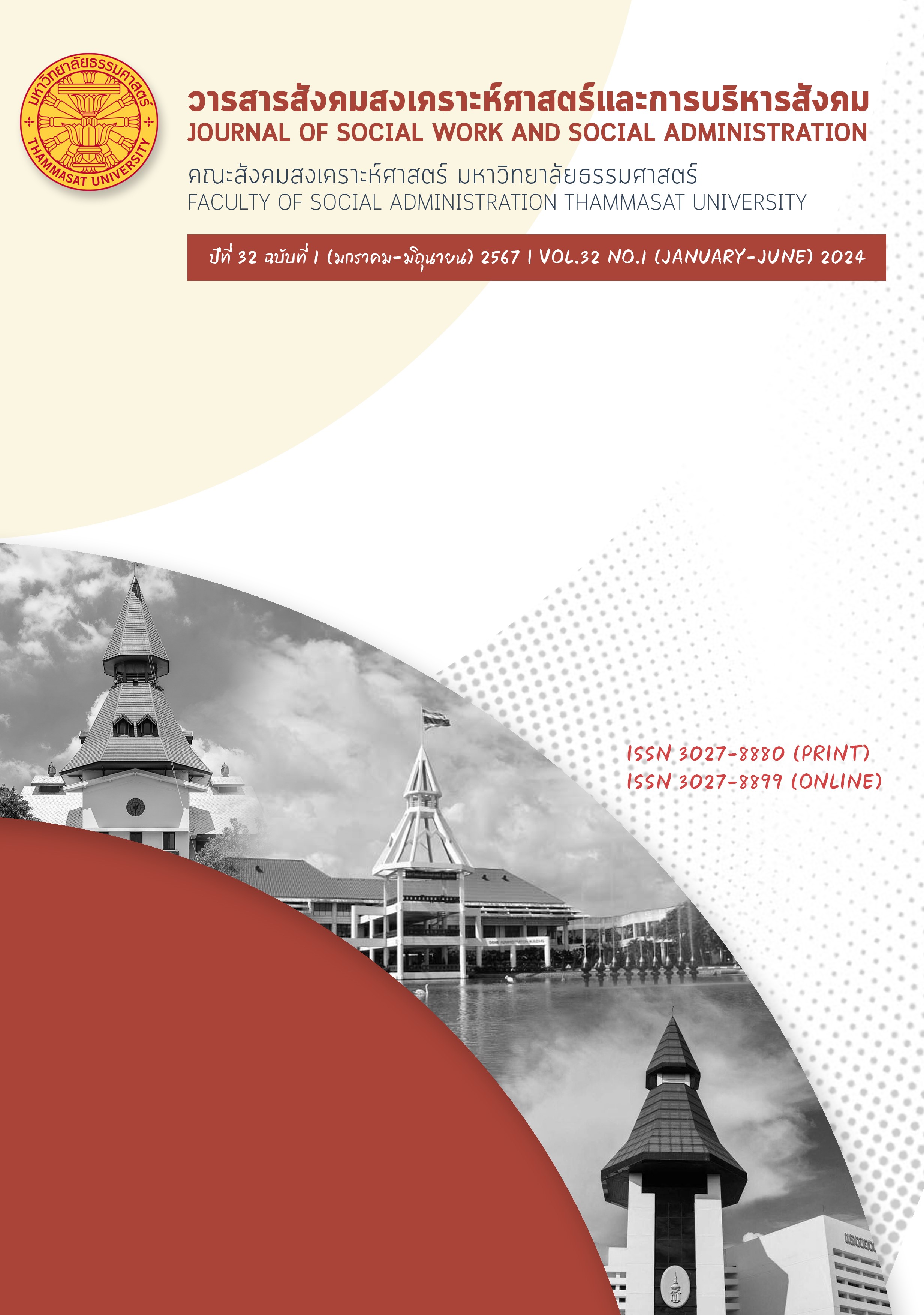The Rug Pull: Crime on Decentralized Finance (DeFi)
Keywords:
Rug pull, Decentralized Finance (DeFi), Digital assetAbstract
This article explores Rug Pull issues, a crime in Decentralized Finance (DeFi), analyzes Rug Pull schemes and factors that have emerged, and includes suggestions on how to prevent them from emerging. This is qualitative research, using documentary research.
It was found that DeFi, uses emerging technology to remove third parties and centralized institutions from financial transactions. Peer-to-peer (P2P) financial transactions are one of the core premises behind DeFi, where both parties agree to exchange digital assets for goods or services without a third party involved. This means that loans are backed by smart contracts that are completed based on the terms both parties, the lender and the borrower, agreed to. Anonymity and a lack of inspection and risk assessment from regulators, hence most DeFi applications, give rise to risks of illicit use, facilitating misconduct. The issuance of promotions or trading on DeFi platforms could be considered non-compliant in many jurisdictions. Equally, when DeFi platforms or activities currently fall outside of the regulated space in some jurisdictions, they raise risks that may be left unaddressed by existing rules. The study of the problems of Rug Pull thus caused four key problems: Globalization, Risk Society, Legal, and International Cooperation. There are three main types of Rug Pull: Liquidity Stealing, Pump-and-Dump, and Limiting sell orders. There were three key factors affecting Rug Pull utilizing Routine Activity Theory: Potential Offender, Digital Asset Investor, and The Absence of Guardians Capable.Finally, the appropriate approach for preventing rug pull is establishing strong network development in terms of digital assets, The integration of important information is a necessary condition for the success of law enforcement in interstate securities trading without federal registration, to raise awareness about the risks of investing in digital assets with the cooperation of the government, private sector, and online community.
References
กิจชัยยะ สุรารักษ์. (2562). แนวทางการป้องกันอาชญากรรมที่เกี่ยวกับสกุลเงินเข้ารหัสในประเทศไทย: กรณีศึกษาบิทคอยน์. ปริญญานิพนธ์ปริญญาดุษฎีบัณฑิต, จุฬาลงกรณ์มหาวิทยาลัย.
เจษฎาพงษ์ ค้ำชู. (2565). หมวดหมู่ของอาชญากรรมที่เกี่ยวข้องกับคริปโทเคอร์เรนซี. วารสารวิชาการอาชญาวิทยาและนิติวิทยาศาสตร์ โรงเรียนนายร้อยตำรวจ, 8(1), 171-185. สืบค้นจาก https://so02.tcithaijo.org/index.php/ forensic/article/download/253991/172762/966694
ปกป้อง ศรีสนิท. (2563). กฎหมายอาญาชั้นสูง (พิมพ์ครั้งที่ 3). กรุงเทพฯ: วิญญูชน
ปรเมศวร์ กุมารบุญ. (2563). ความสัมพันธ์ระหว่างการไร้ตัวตนกับอาชญากรรมไซเบอร์. ปริญญานิพนธ์ปริญญาดุษฎีบัณฑิต, จุฬาลงกรณ์มหาวิทยาลัย.
ภุชงค์ ธีรนันทราพร. (2564). กฎหมายไทยพร้อมหรือยัง ถ้าสถาบันการเงินเกิดภาวะล้มละลาย. วารสารการเงินการคลัง, สืบค้นจากhttp://www.fpojournal.com/bankruptcy-law-bank/
วรารัก เฉลิมพันธุศักดิ์. (2562). เอกสารการเรียนชุดวิชา 82227 ความคิดทางการเมืองและสังคม สาขาวิชารัฐศาสตร์. มหาวิทยาลัยสุโขทัยธรรมาธิราช.
วิสูต กัจฉมาภรณ์. (2563). แนวทางการป้องกันและปราบปรามการฟอกเงินโดยธุรกรรมเงินสกุลเข้ารหัส. ปริญญานิพนธ์ปริญญาดุษฎีบัณฑิต, จุฬาลงกรณ์มหาวิทยาลัย.
สฤณี อาชวานันทกุล. (2555). ผลิตภัณฑ์ทางการเงินที่รับผิดชอบ (4): การ(ไม่)ทำธุรกิจกับลูกค้าที่ทุจริต. ThaiPublica. สืบค้นจาก https://thaipublica.org/2012/12/responsible-products-4/
สาวตรี สุขศรี. (2563). กฎหมายว่าด้วยอาชญากรรมคอมพิวเตอร์และอาชญากรรมไซเบอร์. โครงการตําราและเอกสารประกอบการสอนคณะนิติศาสตร์. มหาวิทยาลัยธรรมศาสตร์.
สกุลชัย เก่งอนันตานนท์. (2564). ถอดบทเรียน Defi ไทยสายซิ่ง จากเคส tuktuk ผ่านมุมมองของ 'Bitkub chain' สรุปแล้วคือแชร์ลูกโซ่หรือไม่.
THE STANDARD WEALTH. https://thestandard.co/bitkub-chain-tuktuk-finance/
สำนักงาน ก.ล.ต. (2565). ความเสี่ยงของสินทรัพย์ดิจิทัลต่อเสถียรภาพทางการเงินในมุมมอง Financial Stability Board (FSB). สืบค้นจาก https://www.sec.or.th /TH/Template3/Articles/2565/200265.pdf
สำนักงาน ก.ล.ต. (2566). ประกาศคณะกรรมการกำกับหลักทรัพย์และตลาดหลักทรัพย์ ที่ กธ. 6/2566 เรื่อง หลักเกณฑ์ เงื่อนไข และวิธีประกอบธุรกิจสินทรัพย์ดิจิทัล (ฉบับที่ 20). สืบค้นจาก https://publish.sec.or.th/nrs/ 9765s.pdf
สำนักงาน ปปง. (2562). ระเบียบวิธีเพื่อการประเมินการปฏิบัติตามข้อแนะนำของ FATF และการประเมิน ประสิทธิผลของระบบ AML/CFT ฉบับปรับปรุง ตุลาคม 2562. กรุงเทพฯ: สำนักงาน ปปง.
สุมาพร (ศรีสุนทร) มานะสันต์. (2562). Smart Contract: เมื่อสัญญาไม่ได้ทำด้วยกระดาษ. กรุงเทพธุรกิจ. สืบค้นจาก https://www.bangkokbiznews. com/blogs/columnist/122819
โสวัตรี ณ ถลาง. (2562). แนวความคิดและทฤษฎีมานุษยวิทยา. มหาวิทยาลัย เกษตรศาสตร์ คณะสังคมศาสตร์. สืบค้นจาก https://kukr.lib.ku.ac.th/kukr_es/BKN/searchdetail/dowloaddigitalfile/20011598/151198
อัณณพ ชูบำรุง และ อุนิษา เลิศโตมรสกุล. (2555). อาชญากรรมและอาชญาวิทยา. กรุงเทพฯ: จุฬาลงกรณ์มหาวิทยาลัย.
Jiraboon. (2564). Bitkub ออกประกาศไม่มีส่วนเกี่ยวข้องกับ KubSwaps หลังนักลงทุนไทยถูก rug pull เสียหายยับ. Siam Blockchain. สืบค้นจาก https://siamblockchain.com/2021/06/06/kubswaps-rug-pull-so-hard-the-noobs-will-scream/
Klungjaturavet, C., & Hirankasi, P. (2564). Defi กับบทบาทของธนาคารในโลกการเงินโฉมใหม่ที่ไร้คนกลาง. วิจัยกรุงศรี. สืบค้นจาก https://www.krungsri. com/th/research/research-intelligence/defi-21
Radius. (2564). Tuktuk หัวทิ่ม เกิดอะไรขึ้นกับโครงการ defi บน Bitkub chain. Bitcoin Addict. สืบค้นจาก https://bitcoinaddict.org/2021/06/01/ what-happened-to-the-tuktuk-defi-project-on-bitkub-chain/
The Intelligence Team. (2564). การเติบโตอย่างรวดเร็วของ Cryptocurrency และการเงินแบบไม่รวมศูนย์ (Decentralized Finance-DeFi) : Paradigm Shift ครั้งประวัติศาสตร์ของระบบการเงินโลก. สืบค้นจาก https://intsharing.co/2021/04/19/%E0%B8%81%E0%B8%B2%E0%B8%A3%E0%B9%80%E0%B8%95%E0%B8%B4%E0%B8%9A%E0%B9%82%E0%B8%95%E0%B8%AD%E0%B8%A2%E0%B9%88%E0%B8%B2%E0%B8%87%E0%B8%A3%E0%B8%A7%E0%B8%94%E0%B9%80%E0%B8%A3%E0%B9%87%E0%B8%A7%E0%B8%82/
Thongchai. (2564). ทีมงาน tuktuk.finance โร่ขอโทษนักลงทุน หลังเปิด fair launch ราคาเหรียญร่วงกว่า 99%. Siam Blockchain. สืบค้นจาก https://siamblockchain.com/2021/05/31/tuktuk-finance-apologises-for-fair-launch/
Appadurai, A. (1996). Modernity At Large: Cultural Dimensions of Globalization. University of Minnesota Press. Retrieved from https://books.google.co.th/books?id=4LVeJT7gghMC
Beck, U. (1992). Risk Society: Towards a new Modernity. Sage Publications London.
Carrick, A. (2021). Squid pain: Crypto-speculators lose $2m to scammers who created fake digital currency on the back of hit TV show Squid Game. THIS IS MONEY. Retrieved from https://www.thisismoney.co.uk/money/crypto/article-10153027/Squid-Game-cryptocurrency-abandoned-rug-pull.html
Chainanlysis, Team. (2022). The 2022 Crypto Crime Reports. CHAINALYSIS. Retrieved from https://go.chainalysis.com/rs/503-FAP-074/ images/Crypto-Crime-Report-2022.pdf
Cohen, L. E., & Felson, M. (1979). Social change and crime rate trends: A routine activities approach. American Sociological Review, 44. 588-609. Ganster.
Attlee, D. (2023). The European Parliament adopts crypto-focused MiCA legislation. COINTELEGRAPH. Retrieved from https://cointelegraph.com/news/the-european-parliament-adopts-crypto-focused-mica-legislation?fbclid=IwAR15aIaYe RHJeQrcT_6ttQO3Ye2z0YH1G3OUc4C7v3L3-5naXqo_B-61LgQ
Majcher, K. (2022). FBI issues recommendations for DEFI investors amid exploits. THE BLOCK. Retrieved from https://www.theblock.co/ post/166579/fbi-issues-recommendations-for-defi-investors-amid-exploits
Marshall, M. (1964). Understanding Media: The Extensions of Man. New York: McGraw-Hill.
NY State Senate. (2022). State Senate Bill S8839. Retrieved from https://www.nysenate.gov/legislation/bills/2021/s8839
Popescu, A. D. (2020). Decentralized finance (DEFI) -The Lego of Finance. Journalism and Education Sciences University of Craiova, 7(1), 321-349. Retrieved from https://sserr.ro/wp-content/uploads/ 2020/07/SSERR_ 2020_ 7_1_321_349.pdf
Prosad, J. M., Kapoor, S., & Sengupta, J. (2015). Theory of behavioral finance. Handbook of Research on Behavioral Finance and Investment Strategies, 1–24. Retrieved from https://doi.org/10.4018/978-1-4666-7484-4.ch001
PwC. (n.d.). Demystifying cryptocurrency and Digital assets. Retrieved from https://www.pwc.com/us/en/tech-effect/emerging-tech/understanding-cryptocurrency-digital-assets.html
UNODC. (n.d.). Module 2 key issues: 2A-Detailed Explanation of Tonry and Farrington's Typology. Retrieved from https://www.unodc.org/e4j/zh/crime-prevention-criminal-justice/module-2/key-issues/2a--detailed-explanation-of-tonry-and-farringtons-typology.html
Downloads
Published
How to Cite
Issue
Section
License
Copyright (c) 2024 Journal of Social Work and Social Administration

This work is licensed under a Creative Commons Attribution-NonCommercial-NoDerivatives 4.0 International License.
The manuscripts published in the Social Work Journal is the copyright of the Social Work Journal, Thammasat University
Any article or opinion appeared in the Social Work Journal will solely be under the responsibility of the author The Faculty of Social Administration, Thammasat University and the editors do not need to reach in agreement or hold any responsibility.



